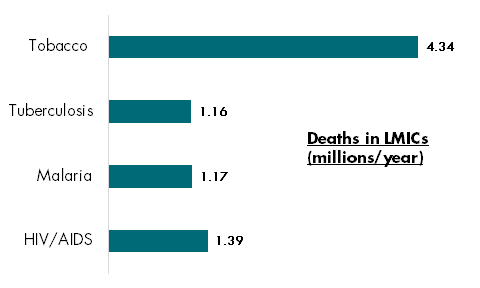“World No Tobacco Day” is coming again — May 31 — but instead of celebrating, I’m shaking my head at the snail’s pace of global action. Each year I learn more horrifying facts about the tobacco epidemic that don’t seem to sink into our global conscience. And until the enormity of these facts is absorbed, I have the sense that I’ll be writing another blog four years from now, just like we did four years ago, calling on the World Bank and IMF to do more about tobacco.
So here are my top three nominations for facts about the tobacco epidemic that you probably don’t know but should.
The Tobacco Epidemic is large
Tobacco-related diseases kill 4.3 million people each year in low- and middle-income countries. That’s more than HIV/AIDS, malaria, and tuberculosis combined (see figure).
Source: The Tobacco Atlas, 5th ed.
The Tobacco Epidemic is growing
The number of daily smokers increased from 721 million to 967 million between 1980 and 2012 (Ng et al. 2014).
The Tobacco Epidemic is deadly
On average smokers lose 10 years of life compared to nonsmokers (Jha et al. 2013).
So the World Bank and IMF need to take stronger action
The single most cost-effective way to save lives in developing countries — raising tobacco taxes — is in the hands of developing countries themselves. However, the World Bank and IMF provide expertise to help those countries adopt effective taxes and to improve tax administration. Of even greater importance, the World Bank and IMF provide political and technical support for countries to combat misinformation and pressure from the tobacco industry. But the last prominent push against tobacco by the World Bank was in 1999. The Asian Development Bank made a high-profile push for tobacco taxes in 2012. Where are the other institutions?
The level of action against tobacco at the World Bank and the IMF is simply inadequate. To my knowledge, neither organization has a single full-time staff person dedicated to tobacco control. Furthermore, most of their tobacco control activities are supported by external foundations rather than their own administrative budgets. The IMF said it would release a policy paper on tobacco tax policies over two years ago, but the document remains unpublished. The most recent item about tobacco on the World Bank’s website appears to be outdated (once again) and is no more than a brief note. The World Bank and IMF could accelerate progress against the tobacco epidemic with a relatively small investment of time and money.
What are they waiting for?
Thanks to Albert Alwang for co-researching tobacco with me this year and to Rachel Silverman for spot-on advice.
CGD blog posts reflect the views of the authors, drawing on prior research and experience in their areas of expertise.
CGD is a nonpartisan, independent organization and does not take institutional positions.






